2024 Webinars
Integrating Massive Amounts of Wind and Solar in Electric Grids
- The joint Northern Virginia/Washington PES Chapter is pleased to host Dr. Benjamin Kroposki, Director of the Power Systems Engineering Center at the National Renewable Energy Laboratory as guest speaker. He will be presenting on the topic of Inverter-Based Resources (IBRs), i.e., solar photovoltaic and wind generators that are increasingly being integrated at a massive scale into the grid through inverters.
Conservation Voltage Reduction (CVR) and VAR/Voltage Optimization (VVO) from a Utility Perspective
- The joint Northern Virginia/Washington PES Chapter is pleased to host Dr. Ashraful Haque, Senior Engineer - Voltage Optimization, at ComEd as guest speaker. He will be presenting on the topic of Conservation Voltage Reduction (CVR) and VAR/Voltage Optimization (VVO) practices that are currently being implemented by utilities as cost‐effective way to deliver energy efficiency. He will discuss ComEd's activities in this area.
Deep Reinforcement Learning for Coordinating Distributed Energy Resources
- The Susquehanna PES Chapter is pleased to host Dr. Avijit Das, an Energy Systems Optimization and Control Engineer at Pacific Northwest National Laboratory. He will present on Coordinating Distributed Energy Resources (DERs) with Deep Reinforcement Learning approaches with comprehensive case studies focusing on modeling the loss of life of battery energy storage systems (BESS) by considering calendrical and cyclical aging effects, including ambient temperature impacts.
2024 Events
December 5th, The Engineering Across Borders: Grad Bites & Global Flavors event brought together a dynamic audience at George Washington University’s Science & Engineering Hall to celebrate Diversity, Equity, and Inclusion (DEI) as part of IEEE DEI Week. Sponsored by the IEEE Power and Energy Society and supported by the Department of Electrical and Computer Engineering (ECE) at GWU, the event was organized by the GW SmartGrid Lab and led by Nazneen Ahmed, a Ph.D. student in the ECE Department, under the supervision of the lab's director, Dr. Payman Dehghanian.
The event featured insightful talks from esteemed panelists, offering attendees a valuable exchange of ideas on fostering inclusivity within the engineering community.
1) Prof. Payman Dehghanian, Founder & Advisor IEEE PES SBC GWU: Importance of DEI in professional organizations like IEEE PES.
2) Dr. Niloofar Pourghaderi, Postdoctoral Fellow, GW SmartGrid Lab: Journey as an international female engineer.
3) Prof. Nan Wu, ECE Department: Advancing DEI principles and promoting female participation in academia and industry.
4) Prof. Tarek El-Ghazawi, Chair of the ECE Department: Insights on DEI in academia and engineering.
The celebration continued with seven vibrant cultural food stations, each representing Bangladesh, China, Iran, Turkey, Spain, Saudi Arabia, and Egypt. Ph.D. students from the GW SmartGrid Lab proudly presented authentic dishes from their home countries, offering guests a flavorful glimpse into their rich cultural heritage.
Dressed in traditional attire, the students engaged in meaningful conversations, sharing personal stories about their academic journeys and the traditions that have shaped their identities. This unique fusion of food, culture, and dialogue added a personal and immersive dimension to the event, fostering a deeper appreciation for diversity and global perspectives within the engineering community.
The event received widespread praise from attendees, including the GWU faculties, undergraduates, graduates, postgraduates, IEEE regional chairs, and other guests. It successfully showcased how DEI values enrich academia and industry, fostering deeper connections across borders.
The Department of Electrical and Computer Engineering at George Washington University recently hosted an insightful seminar on Expansion Planning of Active Distribution Networks in a Multi-Agent Framework by Dr. Milad Kabirifar, a Postdoctoral Associate at the GW SmartGrid Laboratory. Dr. Kabirifar holds a Ph.D. in Electrical Engineering-Power Systems from Sharif University of Technology, Iran, and has previously served as a Research Fellow at the University of Warwick, UK, where his work focused on the cybersecurity aspects of local energy markets.
His seminar explored the critical challenges of expansion planning in active distribution networks within a multi-agent framework. He emphasized the increasing electricity demand driven by technological advancements, urban growth, and infrastructure investments, highlighting the need for strategic resource allocation and optimal utilization of distributed energy resources (DERs). The discussion addressed the complexities of decision-making among multiple stakeholders—including distribution system operators, DER owners, and load aggregators—each with distinct priorities and objectives.
Dr. Kabirifar’s expertise spans the operation and planning optimization of modern power systems, the integration of renewable energy sources and electric vehicles, and the reliability and resilience of power networks. His research contributions extend to bulk-network restoration following blackouts and the technical and economic evaluation of battery energy storage systems in power distribution networks. Through his work, he continues to advance innovative methodologies in mathematical and distributed optimization, offering valuable insights into the future of sustainable and resilient power infrastructure.
On September 18th, we had the privilege of hosting Dr. Jeremy Kasper, Director of the Alaska Center for Energy and Power (ACEP) at the University of Alaska Fairbanks, for an insightful discussion on the incredible journey of ACEP over the past 16 years! 🌟
Dr. Kasper, also a founding co-Director of the Pacific Marine Energy Center, shared the evolution of ACEP from its early days to a thriving team of over 100 researchers focused on solving pressing energy challenges in Alaska. With Alaska accounting for 50% of the microgrids in the US and 10% globally by installed capacity, ACEP's work is crucial not just locally but globally in shaping resilient and adaptive energy systems. ⚡🌍
Dr. Kasper highlighted the importance of microgrids in ensuring reliability, especially in Alaska’s extreme climate. He also discussed the significance of Alaska's Railbelt—a 750+ mile-long series of interconnected microgrids—as a model for reliable and resilient energy solutions, especially in the face of growing electrification and frequent climatic extremes.
The discussions were thought-provoking and highlighted the role of research in transforming and adapting our energy systems. This knowledge not only supports Alaskan communities but also holds valuable lessons for addressing energy challenges globally. 🌐
We are proud to host such events, which influence the future of IEEE activities by bringing together researchers, engineers, and students to address the challenges of tomorrow. These conversations foster innovation and collaboration, setting a path for more resilient and sustainable energy systems. 💡🙌


On May 8-9, we had an incredible opportunity to take a group of students on an enriching tour of Duke Energy's Mount Holly Microgrid Innovation Lab and Honeywell's Headquarters!
The journey began with a bus ride from Washington D.C. to North Carolina, where we engaged in insightful discussions and witnessed firsthand how two major power industry players are leading the way in energy innovation.
At Duke Energy, students had the unique experience of visiting the Microgrid Demonstration Site and participating in a morning group discussion led by three experts in high-voltage DC systems, microgrids, and hydrogen technologies. This was a fantastic opportunity for future engineers to see cutting-edge microgrid technology in action, while understanding the challenges and solutions involved in creating resilient energy infrastructure.
Our visit continued at Honeywell's Headquarters, where we explored the latest in energy efficiency, building technologies, and automation. Honeywell's innovative work in automation and smart technologies gave us a glimpse into how integrated solutions are transforming the future of energy and industry.
These events play a crucial role in influencing the future of IEEE activities by fostering direct engagement between students and industry leaders. Such experiences are invaluable for nurturing new ideas, inspiring young engineers, and creating pathways for collaboration in addressing global energy challenges.
A huge thank you to all those who participated, and to Duke Energy and Honeywell for their hospitality and willingness to share their expertise with the next generation of engineers!
We're thrilled to share insights from the recent seminar facilitated by Dr. Payman Dehghanian, Associate Professor at George Washington University's Department of Electrical and Computer Engineering (ECE) titled "The Economics of Climate Risk Management in Power Infrastructure". The seminar was presented by Dr. Ali Arbnya, Director of Infrastructure Finance & Climate Risk at Quanta Technology.
Dr. Ali delves into the complex challenges and opportunities in addressing climate change within the context of electrical power and energy systems. It emphasizes the necessity of both adaptation and mitigation strategies to ensure the resilience and sustainability of these systems in the face of climate-related threats.
The seminar discusses the economic dimensions of climate adaptation in electric power infrastructure, exploring decision-making processes and the integration of resilience measures. It introduces a risk management framework tailored specifically for power infrastructure systems to mitigate climate shocks. Furthermore, it highlights emerging practices within the power and energy industry aimed at economically managing climate risk and enhancing infrastructure resilience.
Dr. Ali Arbnya brings a wealth of experience to the discussion, drawing from his background as the Director of Infrastructure Finance & Climate Risk at Quanta Technology, as well as his previous roles with the World Bank Group, University of Denver, and Protiviti. His expertise in both economics and engineering informs the seminar's exploration of techno-socio-economic concepts and mechanisms essential for sustainable climate risk management in power infrastructure.
Stay tuned for more events bridging academia and industry to tackle the challenges of climate change!


The ECE Department of George Washington University recently concluded a notable event featuring Dr. Anthony Maciejewski, Director of the ECCS Division at the National Science Foundation (NSF). The presentation provided a deep dive into the intricate challenges faced in robotic dexterity, contrasting the limited capabilities of current industrial robots with the fluidity of human motion. It showcased advancements in kinematically redundant robotic systems, such as anthropomorphic arms, which aim to approach human-like flexibility through sophisticated motion control strategies.
Maciejewski also offered an insightful overview of the National Science Foundation’s Engineering Directorate's recent initiatives, particularly in electrical and computer engineering research and funding. His vast research and educational background, marked by his achievements at Colorado State University and beyond, brought a wealth of knowledge to the attendees. The event fostered meaningful dialogue on the future of engineering research, making it a significant opportunity for faculty and students to engage with the frontiers of robotic technology.
The GWU ECE Department, in partnership with the IEEE PES GWU Student Branch Chapter, successfully hosted the ECE Family Picnic on Sunday, April 28th, at Great Falls Park. Students, faculty, staff, and their families came together for a day of fun, relaxation, and community bonding in a beautiful outdoor setting. The event featured delicious food, refreshing beverages, and engaging conversations, creating a warm and welcoming atmosphere for everyone.

2023
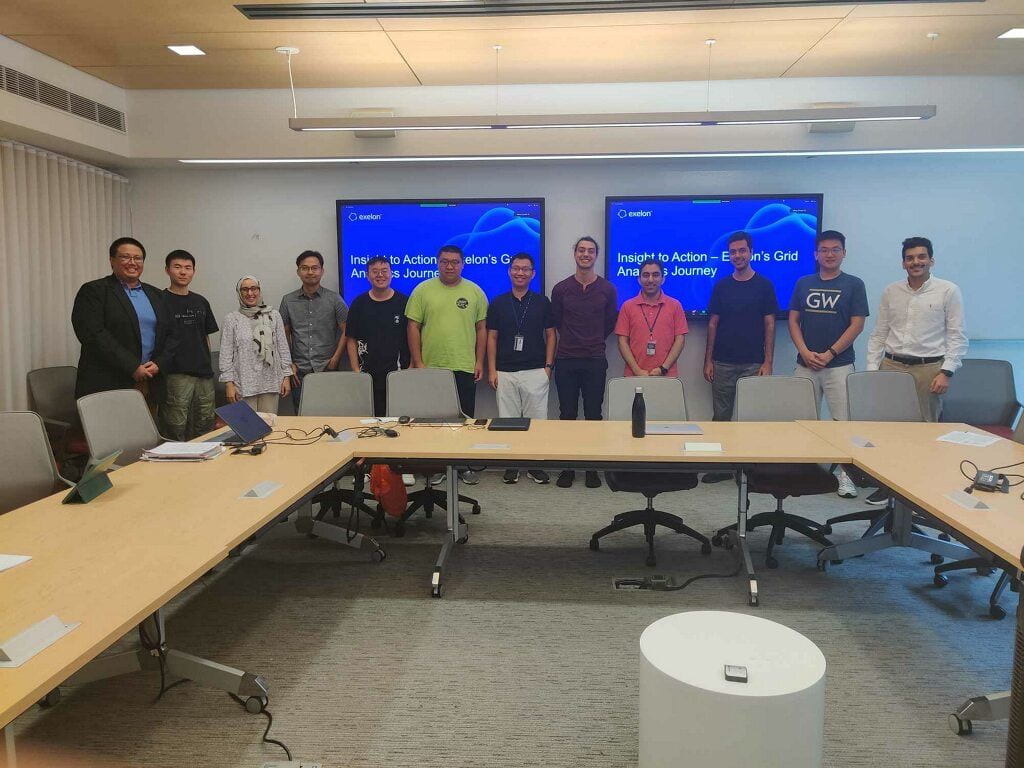
The chapter has hosted a Senimar on Aug. 9, 2023. Mr. Po-Chen Chen, a data science manager in Exelon's Infrastructure and Safety Analytics team, gave a presentation about a T&S Advanced Analytics project, to showcase the importance of investment during project ideation on adoption strategy, creating actionable insights, empowering business/engineers to lead and take active role in analytic projects, how to identify change management and external dependencies upfront as part of analytics prioritization.
The chapter has co-organize a picnic and river hike at the Great Falls National Park with the GW ECE Department on June 15, 2023. During the trip, members of the GW Smart Grid Laboratory and international exchange students from ADA University participated in barbecue, soccer and other activities under the leadership of professors Tarek El-Ghazawi, Can Korman, and Payman Dehghanian.
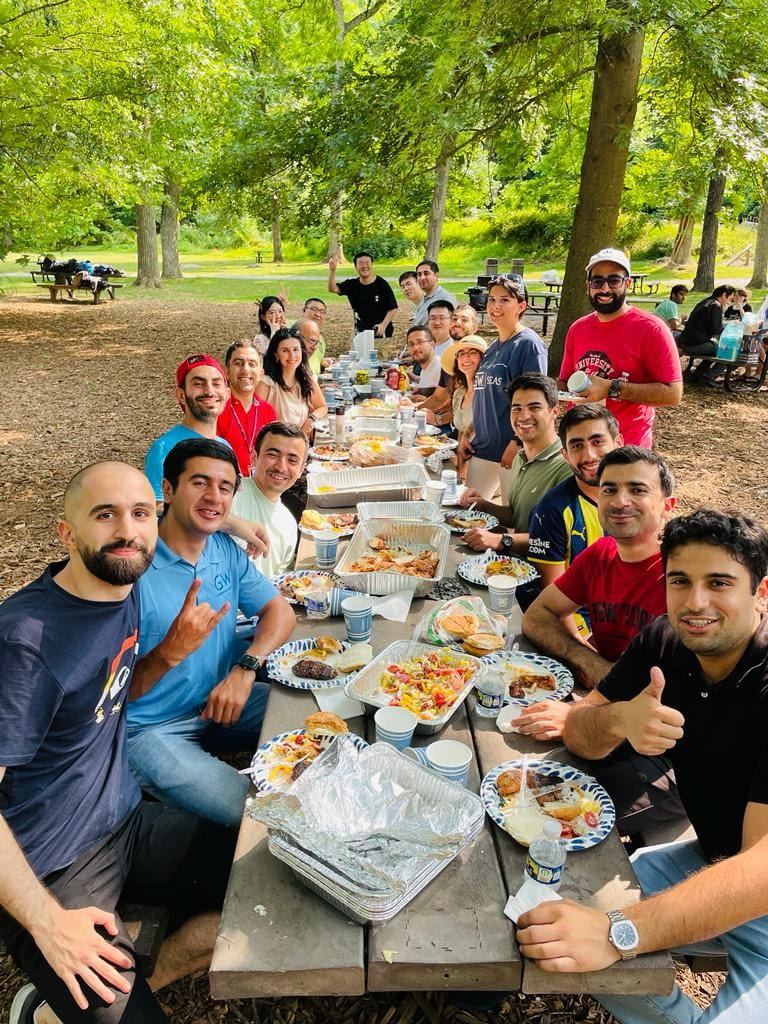

The chapter has hosted a Typhoon HIL training workshop on May 31, 2023. During this session, the Typhoon HIL team presented a selection of case studies demonstrating the potential and benefits of validating energy systems in pre-deployment stages with Typhoon HIL.
The chapter has organized a tour to Duke Energy and Honeywell Inc. in Charlotte, North Carolina, on April 26-27, 2022. The students visited leading industry, Honeywell and Duke Energy Corporation, with innovative and informative tours of the emerging technologies in smart buildings and sustainable energy systems, showcasing the work our graduating students will engage in as part of the ongoing energy transition.
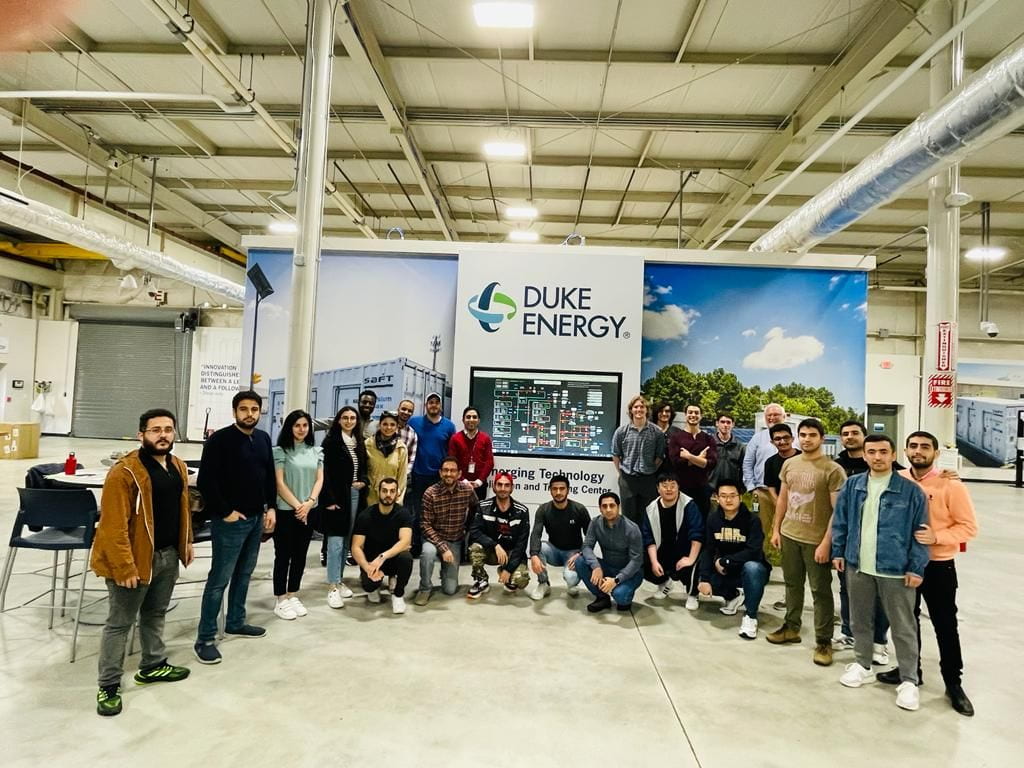
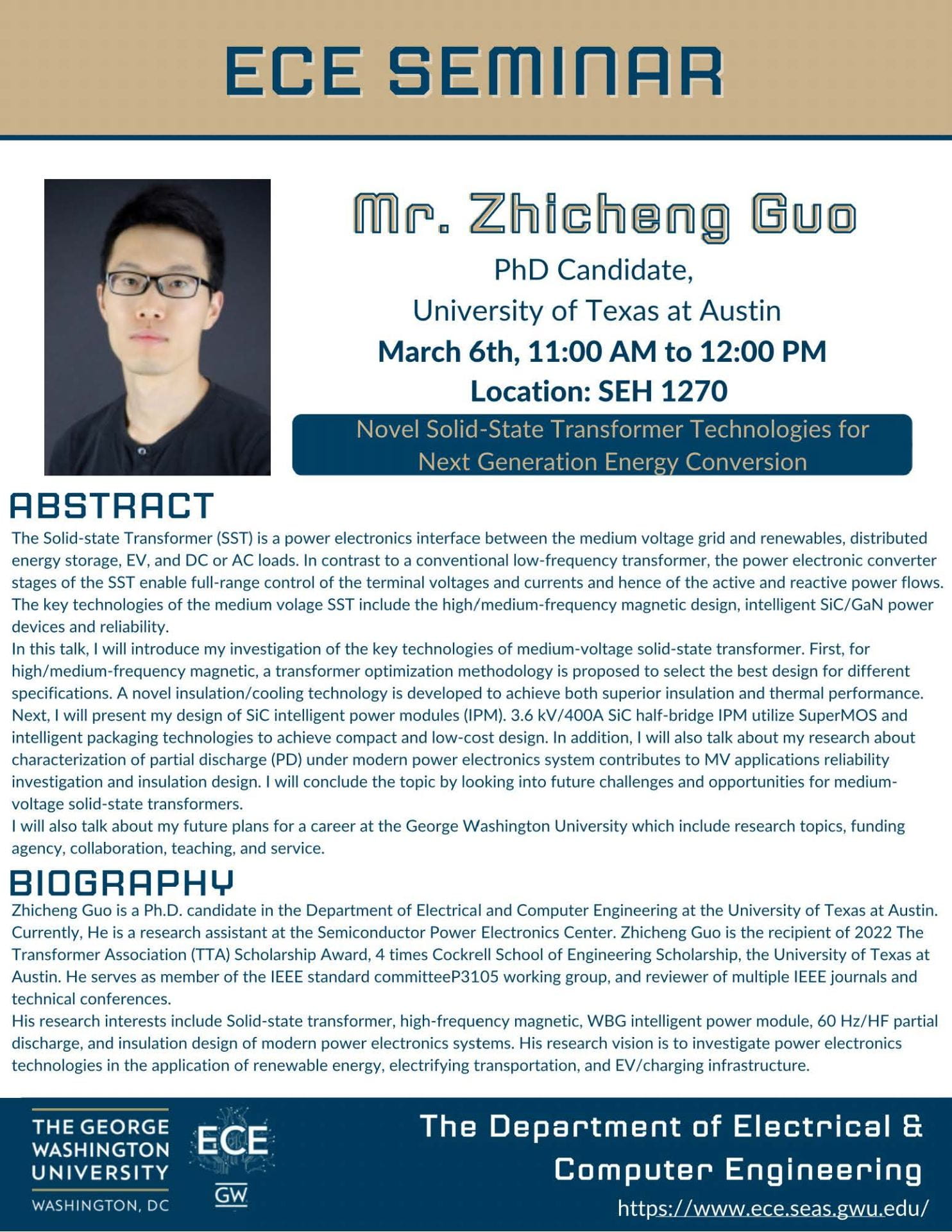
The chapter has co-hosted a Senimar with GW ECE Department on March 6, 2023. Mr. Zhicheng Guo, a Ph.D. candidate in the Department of Electrical and Computer Engineering at the University of Texas at Austin, gave a presentation about his investigation of the key technologies of medium-voltage solid-state transformer.
The chapter has co-hosted a Senimar with GW ECE Department on Feb. 28, 2023. Dr. Xiaofan Cui, a Postdoctoral Fellow with the Stanford Energy Control Laboratory at Stanford University, gave a presentation about addressing challenges on the bandwidth of energy delivery through new modeling, control, design, and results from hardware and simulations.

2022

The George Washington Univ, PE31/IA34 chapter has organized a building tour to Unisphere Building, which is the World's Largest Net Zero Energy Building, on Oct. 28, 2022.
The George Washington Univ, PE31/IA34 chapter has organized a net zero energy building tour on Oct. 13, 2022.

The George Washington Univ, PE31/IA34 chapter has organized a tour by Professor Scott Sklar of his two self-powered buildings -- his home and office building in Arlington on April 12, 2022. These two buildings showcase a variety of energy generation, storage, and efficiency technologies, such as: solar water heating, photovoltaics, geothermal heat exchange, smart battery storage, extensive insulation, reflective paint, a small wind turbine, a hydrogen fuel cell, and a "museum" of employable photovoltaic systems. This tour opened people's eyes to the variability of techniques and the blend of commercially-available technologies to reach a carbon reduction goal.
The George Washington Univ, PE31/IA34 chapter has organized a Combined Cycle Power Plant tour on Feb. 22, 2022. Chapter members met at 4:30 pm in the SEH 2000 conference room and did a quick review of combined heat and power (CHP) plants and GW's energy system. Then at 5:15 pm, people walked over to Ross (where the power plant is located) for a visit.
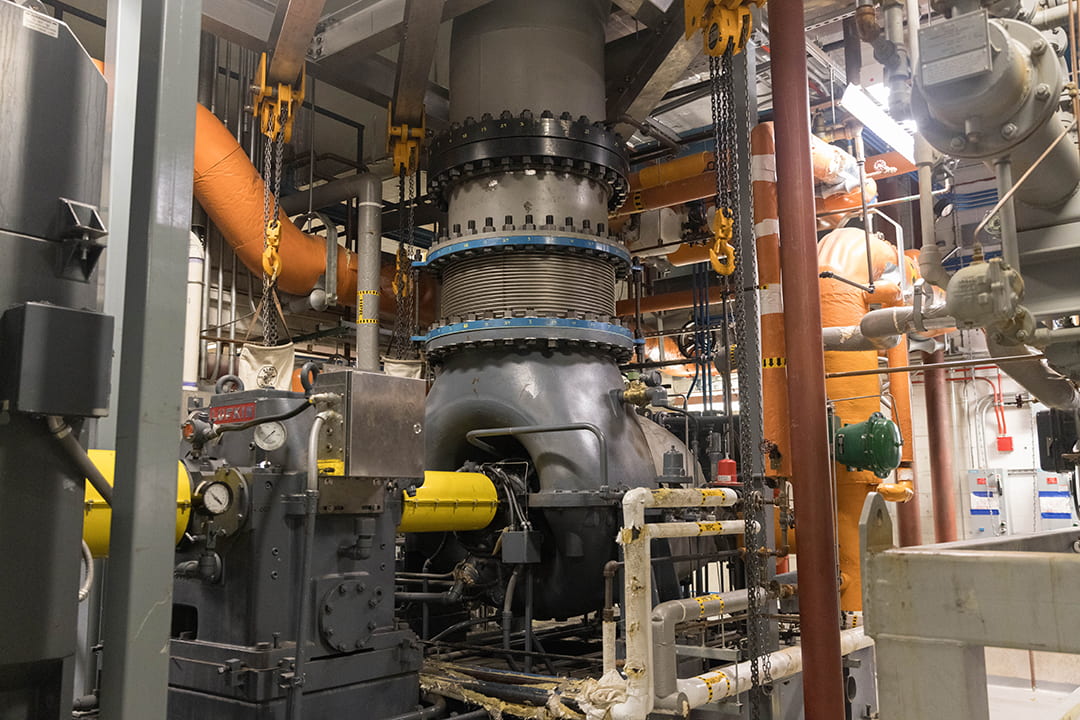
2021
The George Washington Univ, PE31/IA34 chapter has assisted in organizing The FIREWALL Workshop on Sept. 15, 2021. The workshop about the effect of wildfire on power system grids. Many mitigation and solutions to detect the wildfire and enhance the reliability of the power system were discussed.
2019

The chapter has organized the students at the GW SmartGrid Lab to actively participate the 54th IEEE Industry Applications Society (IAS) Annual Meeting, which was held on Sept. 29 – Oct. 3, 2019, in Baltimore, Maryland, USA.
GW Department of Electrical Engineering and Smart Grid Laboratory invited Dr. Aranya Chakrabortty of North Carolina State University (NCSU) to give a talk. Dr. Chakrabortty presented a seminar on August 1st, 2019 and shared his thought on “Wide-Area Control of Power Systems using Structured Reinforcement Learning”. The chapter members have attended this talk.


The chapter has organized the students at the GW SmartGrid Lab to actively participate and serve as the organizing volunteers at the 10th IEEE Power and Energy Society (PES) Conference on Innovative Smart Grid Technologies-North America (ISGT-NA), which was held on Feb. 18-21 2019, in Washington DC.
Dr. Payman Dehghanian was invited as a speaker for the GW Sustainability Lunch Series to discuss “Power Grid Resilience to Extreme Weather Conditions: Unlocking the Full Potential of Grid-Scale PV Generation and Battery Storage”. The meeting was held on February 6, 2019, in the campus George Washington University.
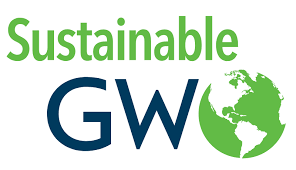
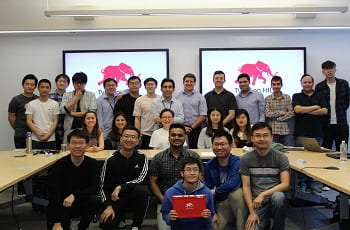
The chapter has organized the students at the GW SmartGrid Laboratory to win the main award in Typhoon Hardware-in-the-Loop (HIL)’s 10 for 10 Awards Program. The Typhoon Awards Program recognizes academic institutions and research groups that are the most prominent champions of Typhoon technologies. Typhoon HIL will reward institutions and research groups that promote Typhoon HIL solutions and process in academia, have the largest number of certified students for Typhoon HIL technology, and which produce and share their incredible work with the Typhoon academic community.
2018

GW SmartGrid Lab members and Ph.D. students, Bo Wang and Mohannad Alhazmi, the student leaders of the GW IEEE Power Systems Engineering Student Chapter, have been awarded a travel grant from the IEEE Industry Applications Society (IAS) to attend the IEEE IAS Annual Meeting 2018. The meeting will be held at September 23-27, in Portland, OR, and is the major annual event of the IEEE IAS. Bo and Mohannad will represent the GW IEEE Student Chapter at the meeting and discuss the future plan of the chapter with other student chapters.
The Department of Electrical and Computer Engineering has established the IEEE Power and Energy Society (PES) - Industry Applications Society (IAS) Joint Student Branch within the department. The student branch will create numerous opportunities for student members through the IEEE PES and IAS Societies. ECE graduate students Bo Wang, Shiyuan Wang, and Mohannad Alhazmi will lead the branch, and Dr. Payman Dehghanian (ECE) will serve as the faculty advisor. IEEE IAS officials will visit the group on June 17 as part of an inauguration meeting





